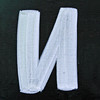Here I am embarking on Week Two of Learning 2.0...several weeks behind schedule. Ah, the story of my life! The lesson for this week introduces us to social networking, and gives us two choices for our Discovery Activity. Of course, while I may be terribly behind, I am still a bit of an overachiever, so I did both. Yay, me!
As for the video "Social Networking in Plain English": I have to say that I thoroughly enjoyed this video (go hunt it down on YouTube, if you are so inclined). I loved the storyboard approach, and I have to admit that it was actually enlightening, too. I may finally be convinced that social networking sites serve worthwhile purposes, rather than merely being vehicles for kiddies, teens, and those who wish they were still teens to chat, flirt, and flame. Quite frankly, if I plan on being the "best librarian I can be" (great...that's just as cheesy on the screen as it was in my head!) in the near future, I may want to consider breaking out of my shell and reaching out to librarians and other information professionals outside the walls of my library. Social networking may allow me to do that in ways that would be virtually impossible in the "real" or non-virtual world. The video is right; connections are definitely easier to see in these virtual networks.
As for MySpace, I have admitted to lurking around in that world, looking at old highschool classmates, people from back home, and the such...basically, doing to others the exact same thing that has caused me to be hesitant about actually creating my own profile. I would probably do the same in Facebook, if I could do so without creating my own profile. So, while I may not be a technophobe, I am apparently a hypocrite. At the very least, I can say, with a little bit of confidence, that I do not believe that MySpace is the social networking site for me. I just find it a bit abrasive and, honestly, kind of ugly sometimes. Of course, I am sure it has its benefits, but I think I will pass.
Before venturing into Learning 2.0, I asked a librarian, "So, exactly how could libraries use social networking sites to reach or help their patrons?" After actually making my self check out some libraries in MySpace, her answer was right on the mark. It seems that many of these libraries may truly be connecting with patrons, and they are definitely able to advertise programs/hours/etc...and get that information straight to users who may or may not check a library's "official" website. For example, one library communicated that the library was open and ready for business after a storm...this message may have reached many patrons in MySpace well before it would in any other "traditional" format. In many ways, being able to post such messages on MySpace allows libraries to (in a way) inform patrons on an individual basis...much like calling or emailing each of them personally, without actually having to call or email anyone individually....neat!
Unlike last week, I read ahead this week, so I know that I am about to create that much delayed/feared profile. Thankfully, it will be in Facebook rather than MySpace, which is sort of an assault on the senses at the very least. I mean, I know we would all love to have our own personal theme song, but that doesn't mean that everyone (and their third cousins twice removed) wants to have said song suddenly blasting from their speakers every time they want to post a hello in your MySpace comments...geez. Of course, while MySpace may not be my ideal space, I am considering creating a profile for my karate instructor/class...that may get more attention from the locals in Mt. Vernon than any other advertising venue we try.
So, until next time, I'll see you in Facebook!





